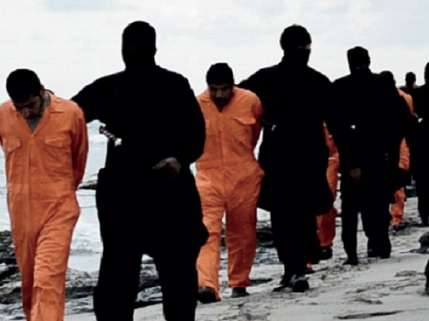If ISIS Isn't Islamic, Were Crusaders Christian?
A summit on violent extremism at the White House aims to tackle radical Islamism in part by quibbling over definitions.


President Obama wrapped up a three day summit on "violent extremism" at the White House attended by representatives from about 60 countries, including some foreign ministers by addressing some of the ways he believed governments ought to fight violent extremism. Obama presented numerous examples, from the Islamic State in Iraq and Syria (ISIS) to Boko Haram, exclusively radical Islamist groups, but was criticized for avoiding the use of that term. Obama's comments at the summit present nothing new.
As usual, military operations against terrorist organizations topped the agenda of how to combat violent extremism. It was followed by appeals to education, community outreach, and economic improvement (terrorist groups, unsurprisingly, are largely fueled by young, unemployed males). But the first approach the president mentioned to combat violent extremism after fighting terrorist organizations was that the U.S. and other governments had to:
confront the warped ideologies espoused by terrorists like al Qaeda and ISIL, especially their attempt to use Islam to justify their violence. I discussed this at length yesterday. These terrorists are desperate for legitimacy. And all of us have a responsibility to refute the notion that groups like ISIL somehow represent Islam, because that is a falsehood that embraces the terrorist narrative.
It's the closest in the remarks the president came to explicitly linking the violent extremism world governments are increasingly worried about to the radical Islamism that fuels it. The president's point, not a new one, is to deny ISIS its claim to represent true Islam (the kind of claim religious fundamentalists almost always use). But earlier this month, at a national prayer breakfast, President Obama said this about violent religious extremists of the past:
And lest we get on our high horse and think this is unique to some other place, remember that during the Crusades and the Inquisition, people committed terrible deeds in the name of Christ. In our home country, slavery and Jim Crow all too often was justified in the name of Christ.
So perhaps the president considers ISIS to be justifying its actions in the name of Islam the way Crusaders did in the name of Christ and believes neither to belong to the religious faith traditions they in which they claim/claimed membership. But it's kind of a "no true Scotsman" situation. President Obama says rejecting ISIS' claim to be Islamic rejects the "terrorist narrative." But rejecting the existence of the claim (and the arguments for it) is more dangerous because it rejects reality.
Last week, The Atlantic ran a long piece by Graeme Wood headlined "What ISIS Really Wants" that explores what the Islamic State really is (a self-styled caliphate based on violent, literalist interpretation of Islam). The whole thing is worth a read but here's a relevant portion on the practice of takfir, excommunication, in which ISIS engages heavily:
Western officials would probably do best to refrain from weighing in on matters of Islamic theological debate altogether. Barack Obama himself drifted into takfiri waters when he claimed that the Islamic State was "not Islamic"—the irony being that he, as the non-Muslim son of a Muslim, may himself be classified as an apostate, and yet is now practicing takfir against Muslims. Non-Muslims' practicing takfir elicits chuckles from jihadists ("Like a pig covered in feces giving hygiene advice to others," one tweeted).
Think Progress ran a response piece, based on interviews with scholars, that posited, among other things, that "Wood's argument perpetuates the false idea that Islam is a literalistic tradition where violent texts are taken at face value." Wood's argument wasn't that only ISIS' literalistic tradition is Islamic but rather that Islam, as pretty much any belief system, includes literalistic traditions. Whether or not those traditions are considered "legitimate" is a subjective exercise, and ultimately a pointless one, because it doesn't change the real-world consequences of those traditions in action.
